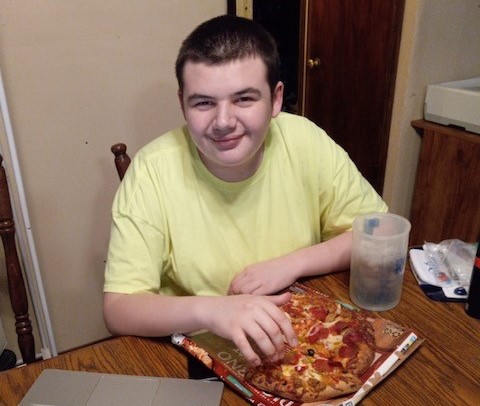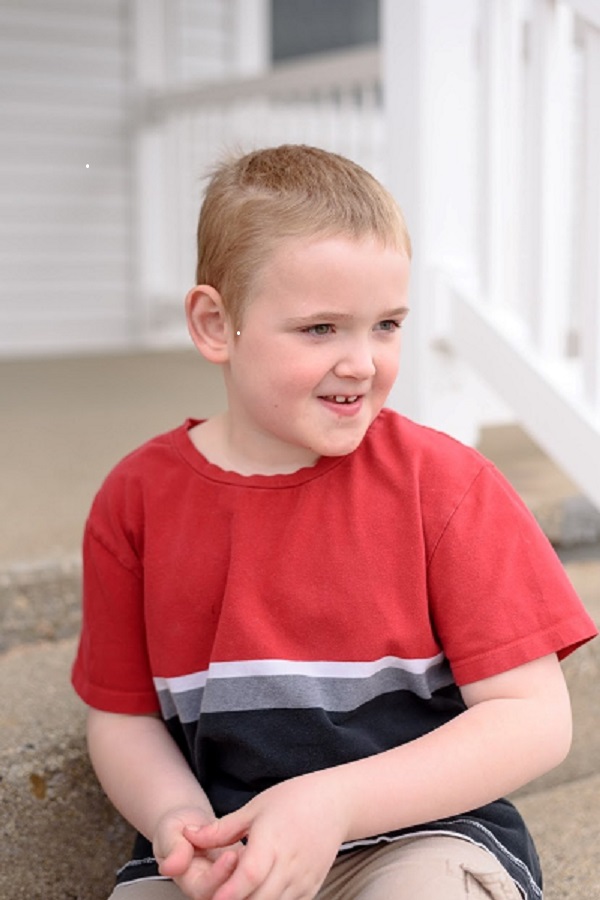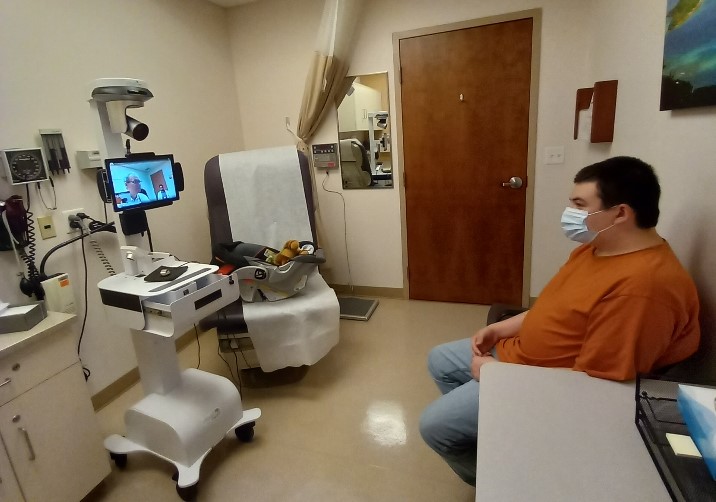Imagine cutting your travel time in half to see a medical specialist. Thanks to telemedicine carts, patients at Carle are gaining access to specialists in an outpatient setting closer to home.
Cassia Wood is spending half the drive time with her 16-year-old son, Keagan, from their home near Flora to.jpg?width=200&height=169) Carle Effingham.
Carle Effingham.
“The biggest plus is the convenience. For us to travel like we were for in-person visits, it would take almost all day. For any parent of a child with a disability, that is big,” Wood said.
She said Keagan is on the autism spectrum, has encephalopathy, anxiety, depression and chromosome abnormality. A patient of Carle’s Charles Morton, MD, since he was 4 years old, Keagan does well communicating with Morton through the telemedicine cart. “It’s technology so he’s all for it,” his mother said. “This is a great asset for a rural community and access to a big hospital system.”
 For Jaclyn Miller, access to the telemedicine cart means a 20-minute drive to Carle Effingham with her son, Lincoln, versus a 1.5-hour drive to Urbana from her home in Newton. Employed as a sonographer at Carle in Maternal Fetal Medicine, she said the telemedicine visits for 10-year-old Lincoln every six months work great. Lincoln has severe autism so the smaller office setting for regular checkups helps with his stress, his mother said.
For Jaclyn Miller, access to the telemedicine cart means a 20-minute drive to Carle Effingham with her son, Lincoln, versus a 1.5-hour drive to Urbana from her home in Newton. Employed as a sonographer at Carle in Maternal Fetal Medicine, she said the telemedicine visits for 10-year-old Lincoln every six months work great. Lincoln has severe autism so the smaller office setting for regular checkups helps with his stress, his mother said.
Miller and her husband both have full-time jobs and the time back really helps. She said, “Whenever you don’t have to include three hours of driving, that opens up our schedule.”
The added access Carle provides developmental pediatric patients is due to a fleet of telemedicine carts used by physicians. Cardiology, Endocrinology, Maternal Fetal Medicine, Oncology Support, Psychiatry, Nutrition Services, Rheumatology and Sleep Medicine are also providing outpatient telemedicine connections. Even Carle patients admitted to the hospital, like Carle Richland Memorial Hospital in Olney, Carle Eureka or Carle BroMenn may access Carle specialists via telemedicine carts in areas such as stroke, critical care, psychiatry and the neonatal intensive care unit.
Charles Morton, MD, Developmental Pediatrics, said he treats children ages 2 to 18 with developmental conditions such as Attention Deficit Hyperactivity Disorder, Down Syndrome and autism. He has a comfort level with using the cart because he worked with telemedicine when he was a physician in the U.S. Air Force. The capabilities of the tool, however, have advanced.
“The ability to hear the heart and lungs with the clarity built into the cart is fantastic,” Morton said.
Another interesting aspect is the physician can check the eyes, mouth and ears using the cart’s otoscope and hand-held camera. What the doctor sees inside the ear, the patient can see as well through the screen on the cart, which is simply not possible with an in-person ear check, he said. The visits also can provide height, weight, blood pressure and heart rate measurements of the patient, which are essential for developmental pediatricians when deciding medication needs such as Ritalin or Adderall.
During the start of an appointment, the provider receives assistance by a care team member physically present with the patient at the Carle location.
That care team member takes the patient’s vital signs and assists with the physical exam. The doctor takes it from there, communicating on a screen with the patient. Consults in developmental pediatrics can be an hour and 20 minutes while return visits last 40 minutes.
“Telemedicine can work really well for the kids,” Dr. Morton said.
Madelyn Bennett, PMP, manager of Virtual Health for Carle Transformation Services, said feedback from patients and clinicians is increasingly favorable due to improved timeliness and continuity of care. “As we look to grow our technology infrastructure and expand access to care in rural areas, we rely on forward thinkers like Dr. Morton to bridge the gap in healthcare and increase adoption of new technologies.”
For parents, telemedicine means gaining access to high-quality care with visits treated by insurance companies like an in-person visit, yet not bearing as much of a financial burden for taking time off work and commuting long distances for regular visits to a specialist, Dr. Morton said. ”These visits have the feel of an in-person visit, with proximity to where our families live and work. This is a definite win-win for all.”
Cassia Wood is spending half the drive time with her 16-year-old son, Keagan, from their home near Flora to
.jpg?width=200&height=169) Carle Effingham.
Carle Effingham.“The biggest plus is the convenience. For us to travel like we were for in-person visits, it would take almost all day. For any parent of a child with a disability, that is big,” Wood said.
She said Keagan is on the autism spectrum, has encephalopathy, anxiety, depression and chromosome abnormality. A patient of Carle’s Charles Morton, MD, since he was 4 years old, Keagan does well communicating with Morton through the telemedicine cart. “It’s technology so he’s all for it,” his mother said. “This is a great asset for a rural community and access to a big hospital system.”
 For Jaclyn Miller, access to the telemedicine cart means a 20-minute drive to Carle Effingham with her son, Lincoln, versus a 1.5-hour drive to Urbana from her home in Newton. Employed as a sonographer at Carle in Maternal Fetal Medicine, she said the telemedicine visits for 10-year-old Lincoln every six months work great. Lincoln has severe autism so the smaller office setting for regular checkups helps with his stress, his mother said.
For Jaclyn Miller, access to the telemedicine cart means a 20-minute drive to Carle Effingham with her son, Lincoln, versus a 1.5-hour drive to Urbana from her home in Newton. Employed as a sonographer at Carle in Maternal Fetal Medicine, she said the telemedicine visits for 10-year-old Lincoln every six months work great. Lincoln has severe autism so the smaller office setting for regular checkups helps with his stress, his mother said.Miller and her husband both have full-time jobs and the time back really helps. She said, “Whenever you don’t have to include three hours of driving, that opens up our schedule.”
The added access Carle provides developmental pediatric patients is due to a fleet of telemedicine carts used by physicians. Cardiology, Endocrinology, Maternal Fetal Medicine, Oncology Support, Psychiatry, Nutrition Services, Rheumatology and Sleep Medicine are also providing outpatient telemedicine connections. Even Carle patients admitted to the hospital, like Carle Richland Memorial Hospital in Olney, Carle Eureka or Carle BroMenn may access Carle specialists via telemedicine carts in areas such as stroke, critical care, psychiatry and the neonatal intensive care unit.
Charles Morton, MD, Developmental Pediatrics, said he treats children ages 2 to 18 with developmental conditions such as Attention Deficit Hyperactivity Disorder, Down Syndrome and autism. He has a comfort level with using the cart because he worked with telemedicine when he was a physician in the U.S. Air Force. The capabilities of the tool, however, have advanced.
“The ability to hear the heart and lungs with the clarity built into the cart is fantastic,” Morton said.
Another interesting aspect is the physician can check the eyes, mouth and ears using the cart’s otoscope and hand-held camera. What the doctor sees inside the ear, the patient can see as well through the screen on the cart, which is simply not possible with an in-person ear check, he said. The visits also can provide height, weight, blood pressure and heart rate measurements of the patient, which are essential for developmental pediatricians when deciding medication needs such as Ritalin or Adderall.
During the start of an appointment, the provider receives assistance by a care team member physically present with the patient at the Carle location.
That care team member takes the patient’s vital signs and assists with the physical exam. The doctor takes it from there, communicating on a screen with the patient. Consults in developmental pediatrics can be an hour and 20 minutes while return visits last 40 minutes.
“Telemedicine can work really well for the kids,” Dr. Morton said.
Madelyn Bennett, PMP, manager of Virtual Health for Carle Transformation Services, said feedback from patients and clinicians is increasingly favorable due to improved timeliness and continuity of care. “As we look to grow our technology infrastructure and expand access to care in rural areas, we rely on forward thinkers like Dr. Morton to bridge the gap in healthcare and increase adoption of new technologies.”
For parents, telemedicine means gaining access to high-quality care with visits treated by insurance companies like an in-person visit, yet not bearing as much of a financial burden for taking time off work and commuting long distances for regular visits to a specialist, Dr. Morton said. ”These visits have the feel of an in-person visit, with proximity to where our families live and work. This is a definite win-win for all.”
Categories: Redefining Healthcare, Community
Tags: autism, children, telehealth
